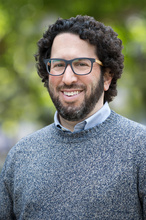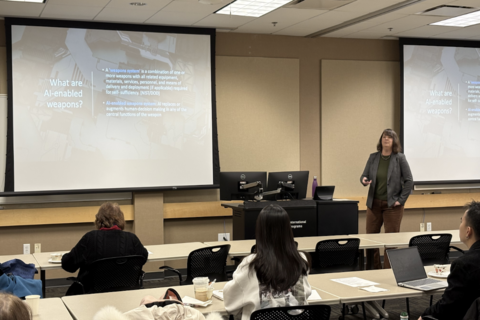Scholars and artists in the College of Liberal Arts and Sciences are sharing their respective projects relating to war and genocide as part of a new collaboration to further work in this field.
The Interdisciplinary Consortium for the Study of War and Genocide brings together faculty working in the areas of war, genocide, or ethnic and political violence to collaborate and exchange knowledge.
Associate dean for research and infrastructure Joshua Weiner noticed this subject continued to come up as he spoke with scholars and artists across the College of Liberal Arts and Sciences.
Faculty in various departments—including dance, theatre arts, political science, sociology and criminology, and history—told Weiner about their varied projects dealing with war, its antecedents, and its aftermaths.
The 20th century was marked by unprecedented levels of mass violence, including war, ethnic and political conflict, and genocide. Despite these grim lessons, war, state‐sponsored violence, and terrorism remain widespread in the first decades of the 21st century, with no sign of abatement on the horizon.

Ongoing humanitarian crises attendant to war create an imperative for research scholars to document the antecedents, dynamics, and consequences of war to advance more effective means of ensuring justice and accountability in the aftermath. Exploration of war’s human causes and aftermath also remain rich topics for the humanities, as well as an impetus for the performing and visual arts.
“It seemed obvious that we should try to bring a group together to share ideas and see what emerged,” Weiner said.
Fall event kicked off broader conversation
Weiner and associate professor Stephanie DiPietro from the Department of Sociology and Criminology invited a broad swath of CLAS researchers, as well as the College of Law’s Center for Human Rights, to participate in a “data blitz” event in fall 2024. The event was organized with support from the Office of the Vice President for Research’s Research Development Office (RDO).

Eleven faculty gave short talks on their work related to the topics of war, ethnic conflict, and genocide, and out of this event the Interdisciplinary Consortium for the Study of War and Genocide developed.
“The goal is to bring together researchers from diverse academic disciplines to advance understanding of the psychological, cultural, systemic, historical, legal, and political dimensions of war and genocide, and to foster collaboration that will enhance the reach and impact of the consortium’s work,” DiPietro said.
The consortium also co-sponsored an event by the UI Center for Human Rights that brought Patricia Heberer Rice, senior historian at the U.S. Holocaust Memorial Museum, to campus to speak about medical eugenics in Nazi Germany at a well-attended event in the Old Capitol Senate Chamber.
Monthly workshops continuing this spring
In a series of monthly workshop meetings beginning in December 2024 and continuing through spring 2025, consortium faculty are presenting their work in more detail, seeking feedback from an interdisciplinary group of scholars.
Sara Mitchell, professor in the Department of Political Science, recently spoke about her work analyzing the response of governments and agencies to natural disasters and conflicts in different countries around the world. Jovana Davidovic, associate professor in the Department of Philosophy, spoke about the ethical issues surrounding artificial intelligence-enabled weapons systems.

DiPietro will speak at the February meeting about militarism, masculinities, and violence across the life course, while Elke Heckner, Associate Professor of Instruction in German, will discuss her work on the limits of public war memorial culture and the resurgence of violent ethnic conflict.
In March, the consortium will partner with the international studies program in CLAS to bring University of Nebraska professor Bedross Der Matossian to campus, where he will speak about his work on the early 20th century Armenian genocide.
Ashley Howard, assistant professor in the Department of History, and Elizabeth Menninga, associate professor in the Department of Political Science, are scheduled to present at the April meeting.
“The group is off to a great start,” Weiner said. “Our next steps involve planning a major symposium on our campus, possibly in collaboration with the Obermann Center, and seeking out grant mechanisms that members of the group might apply for to further collaborative research amongst this interdisciplinary group.”